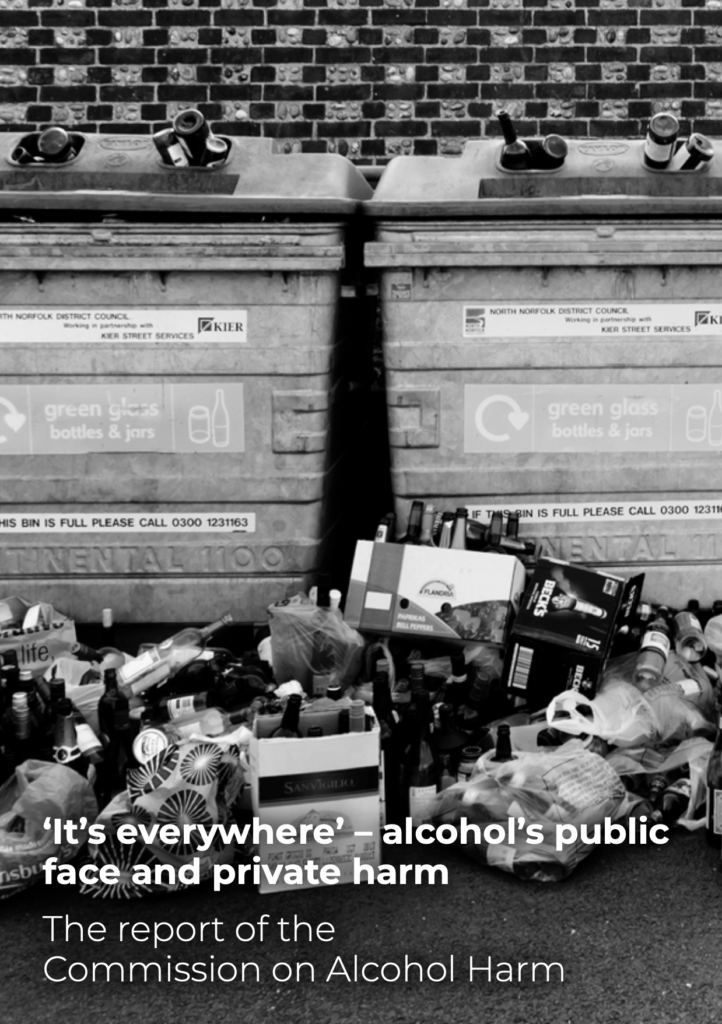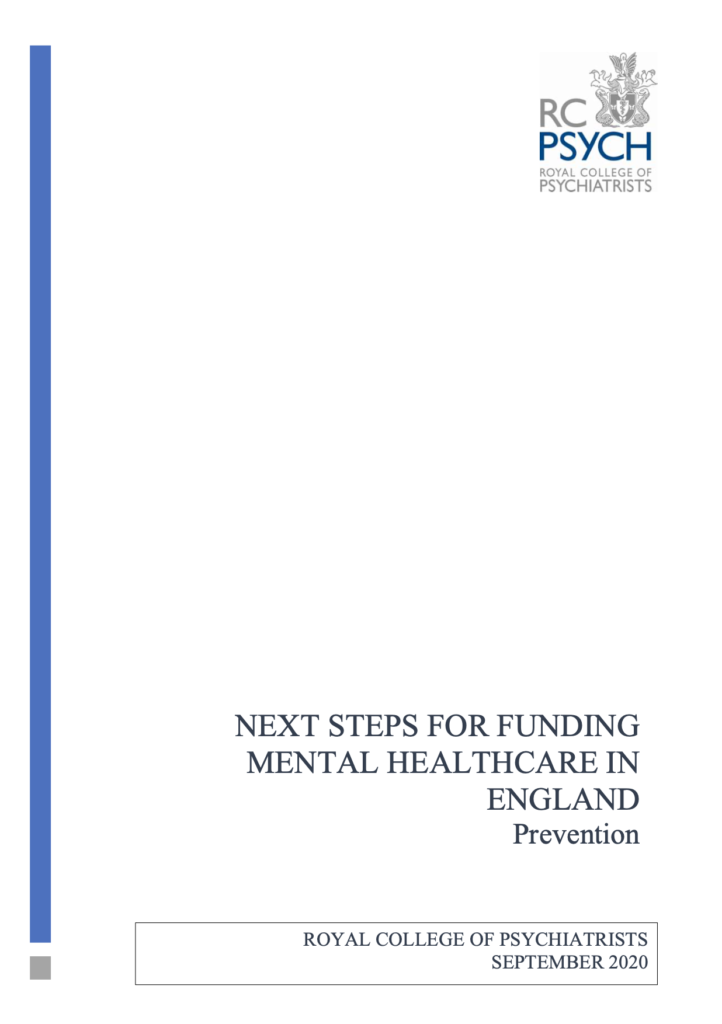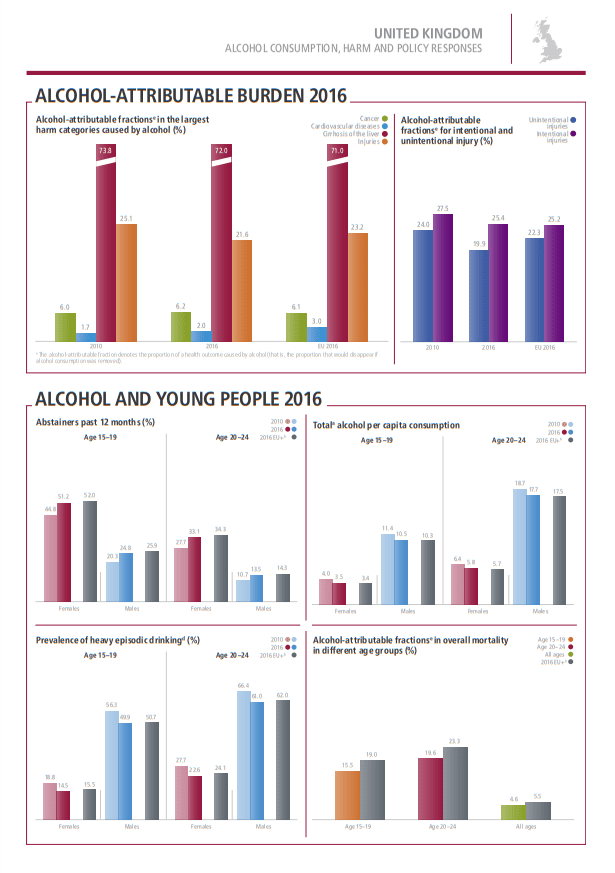The Commission on Alcohol Harm was established to examine the current evidence on alcohol harm in the UK, as well as recent trends in alcohol harm and the changes needed to reduce the alcohol burden. The Commission’s objective was also to examine the need for a new comprehensive alcohol strategy for England, which takes account of the strategies in place in Scotland, Wales and Northern Ireland, and to consider UK-wide priorities in areas where policy is not devolved.
The Commission was chaired by Baroness Finlay of Llandaff and consisted Members of Parliament (MPs) and health experts. The funding was provided by the Alcohol Health Alliance UK which also acted as the Secretariat. The full list of Commissioners can be accessed on their website.
A healthy economy is driven by a healthy population. To be effective, a recovery strategy must include policies to help put an end to alcohol harm.”
Baroness Finlay of Llandaff
The Commission recently released their report on alcohol harm in the UK and what needs to be done to tackle the problem. The report was informed by over 140 submissions of written evidence from organisations and individuals, of which around 40 were from people with direct lived experience of alcohol harm. The Commission heard testimony from 39 witnesses in four oral evidence sessions held in March 2020.
Key findings from the Commission on Alcohol Harm
- Children living with an alcohol-dependent parent are five times more likely to develop eating disorders, twice as likely to develop alcohol dependence or addiction and three times as likely to consider suicide.
- Families affected by alcohol can struggle to access the support they need.
- Alcohol is the leading risk factor for ill health, death and disability among people aged 15 to 49.
- The UK has the fourth highest level of prenatal alcohol consumption in the world and FASD is estimated to cost the UK £2 billion a year.
- There were 1.26 billion hospital admissions related to alcohol in 2018/19.
- Alcohol costs the NHS and estimated £3.5 billion in total.
Alcohol harm in the UK
According to the WHO Europe, the total per capita alcohol consumption (alcohol users only) in UK among both males (21.8 litres) and females (7.6 litres) is higher than than the European regional average. This has led to a heavy alcohol attributable burden within the country.
In the UK,
- 72% of liver cirrhosis,
- 21.6% of injuries,
- 6.2% of cancers, and
- 2% of cardiovascular diseases
are caused by alcohol.
Alcohol harm in young people is also high in the UK.
- Almost half (49.9%) of all boys between 15 to 19 years engage in heavy episodic alcohol use, for girls of the same age group the figure is 14.5%.
- About two thirds (61%) of young adult men between 20 to 24 years of age binge on alcohol, for women of the same age group the figure is 22.6%.
- 15.5% of adolescents between 15 to 19 years and 19.6% youth between 20 to 24 years die prematurely due to alcohol related causes.
The cost of alcohol to the UK
The cost of the alcohol burden in the UK does not stop at the £3.5 billion cost to the NHS. It goes far beyond that.
Research has found the following costs:
- In 2015, 167,000 years of working life were lost as a result of alcohol.
- The annual cost of alcohol damage to the economy is around £7 billion.
- Alcohol was linked with 39% of violent crime incidences in England and 49% in Wales.
- About 200,000 children in the UK suffer emotional and mental trauma due to living with an alcohol dependent parent or carer.
- The total social cost of alcohol to society is estimated to be at least £21 billion a year.
The problems are further exacerbated by the funding cuts to alcohol services. In recent years, over two-thirds of local authorities have cut their funding for alcohol services, many by over 50%.


English services for people with alcohol problems risk collapsing
The Royal College of Psychiatrists says that services were in desperate need for better funding to stop lives being lost to alcohol and other substance use disorders.
A near-doubling in the number of higher-risk alcohol users during lockdown has spurned warnings that alcohol and other drugs treatment services in England are struggling to cope and in dire need of funding – commensurate with the magnitude of the problem they are facing.
The Royal College of Psychiatrists analysed data from Public Health England showing the prevalence of people consuming alcohol at even higher risk was at almost a fifth (19%) in June, up from 10.8% in February 2020 – just before the coronavirus pandemic hit the UK.
Using population estimates from the Office for National Statistics, the Royal College of Psychiatrists said the June figure equated to more than 8.4 million people, a rise from around 4.8 million four months earlier. Higher-risk consumption is defined as people using more alcohol than the recommended levels of no more than 14 units a week for men and women.
The scientists at the Royal College of Psychiatrists raised concerns that because addiction services have been “starved of funding” for years, they are on the brink of collapse, unable to treat the “high numbers” of people who are in need of help due to their alcohol use problems. The report called on ministers to reverse cuts to help local authorities work towards investing £374 million into adult services and address the need for investment, according to the Midhurst and Petworth Observer.
Covid-19 has shown just how stretched, under-resourced and ill equipped addiction services are to treat the growing numbers of vulnerable people living with this complex illness,” said Prof Julia Sinclair, chair of the College’s addictions faculty, as per The Guardian.
There are now only five NHS inpatient units in the country and no resource anywhere in my region to admit people who are alcohol dependent with co-existing mental illness.
Drug-related deaths and alcohol-related hospital admissions were already at all-time highs before Covid-19. I fear that unless the government acts quickly we will see these numbers rise exponentially.”
Prof Julia Sinclair, chair, Royal College of Psychiatrists’ addictions faculty
The College’s recently published Next Steps for Funding Mental Health Care in England: Prevention report also makes the case for an additional £43m for children’s drug and alcohol services and £30m for new buildings and updates to existing ones – also known as capital projects.
Latest data shows there were 4,359 drug-related deaths in England and Wales in 2018, the highest on record, while the 1.26 million alcohol-related hospital admissions in 2018/19 were also the highest on record.
Dr Adrian James, president of the Royal College of Psychiatrists, said the government must commit to substantial investment in public health to prevent more lives from being “needlessly lost” to addiction, according to The Guardian.
The college is warning that cuts made to addiction services since 2013/14 mean the higher numbers of people needing help could miss out on life-saving treatment.
Addiction services have been starved of funding in recent years meaning many are not able to treat and care for the huge numbers of people who are [consuming alcohol] at high risk,” said Dr Adrian James, president of the Royal College of Psychiatrists, as per The Guardian.
More lives will be needlessly lost to addiction unless the government acts now and commits to substantial investment in public health, including adult addiction services, in the spending review.
I urge the government to implement the recommendations in our report which would see mental health services expand to be the biggest in Europe, with a much-needed focus on tackling inequalities.”
Dr Adrian James, President, Royal College of Psychiatrists
Increasing alcohol harm during the COVID-19 pandemic
Alcohol harm in the UK worsened during the COVID-19 pandemic. The Global Drugs Survey published a special edition (a non-representative survey) related to COVID-19. Over 55,000 people took part in the survey out of which 2136 were Brits. The survey ran for seven weeks between May and June 2020.
Data on alcohol use among the British participants are as follows:
- Almost half (48%) of respondents reported an increase in alcohol use during COVID-19.
- Out of these, 40% stated the increase was due to stress about the pandemic, 27% said the increase was because they were lonely and 29% said because they were depressed.
- 30% alcohol users stated their mental health deteriorated as a result and 47% said their physical health deteriorated.
The increased alcohol consumption was extenuated by the alcohol use along with audio or video conferencing with friends which was a trend promoted heavily by Big Alcohol during the pandemic.
The pandemic has brought into sharp focus the high alcohol burden in the UK and that urgent action is needed.
If we wish to emerge from the coronavirus pandemic as a healthier society, we must address the ongoing health crisis of alcohol harm,” said Professor Sir Ian Gilmore, Chairperson of the Alcohol Health Alliance, as per Evening Express.
Professor Sir Ian Gilmore, Chairperson, Alcohol Health Alliance
What needs to be done
The situation is grave. Alcohol harm is high, the burden is growing, costs are increasing and funding for alcohol services has been decreasing over the years.
The Commission on Alcohol Harm emphasizes that not enough is being done to tackle the alcohol problem in the UK. Specifically the cross-cutting issues that arise with alcohol harm related to child and youth health and rights, development, inequality in access to health services, stigma and discrimination and funding.
Alcohol harm impacts us all – in families, our communities and throughout society. For too long, the onus has been on individuals, with [alcohol users] urged to ‘[consume] responsibly’,” said Baroness Ilora Finlay, Chairperson of the Commission on Alcohol Harm, as per, Evening Express.
We need to finally acknowledge the true scale of the harm caused by alcohol, which goes far beyond individuals who [consume alcohol], and put the responsibility squarely with the harmful product itself.
Baroness Ilora Finlay, Chairperson of the Commission on Alcohol Harm
The Commission recommends the following:
- The Government should develop a new alcohol strategy with targeted measures to support families and protect children from harm, including alcohol-fuelled violence.
- The strategy should be “science-led” and follow the World Health Organisation’s evidence-based recommendations on reducing the use of alcohol.
- The strategy should consider the affordability of alcohol, and the introduction of minimum unit pricing (MUP) in England, as well as restrictions on advertising and marketing such as ending sports sponsorship and better information for consumers.
- Action to challenge alcohol’s position in UK culture, encouraging conversations about alcohol use and for people to be open about the effects of alcohol on their health and those around them.
Sources
Royal College of Psychiatrists (press release): “Addiction services not equipped to treat the 8 million people drinking at high risk during pandemic, warns Royal College“
Alcohol Health Alliance UK: “‘It’s everywhere’ – alcohol’s public face and private harm: The report of the Commission on Alcohol Harm (2020)“
Evening Express: “‘Hidden health crisis’ of alcohol harm must be addressed, report warns“
The Telegraph: “Alcoholism is the silent pandemic that will kill more people than coronavirus“
The Guardian: “Almost half of Britons drinking more due to Covid, survey finds“
Russell Webster: “Drug And Alcohol Use Through The Pandemic“
The Guardian: “English addiction services on brink as number of higher-risk drinkers doubles“

